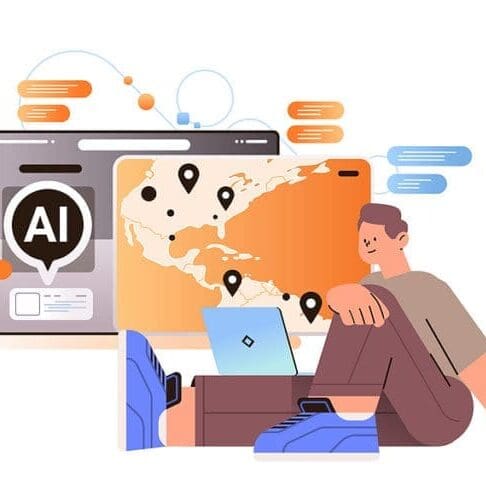
From efficiency to sustainability, AI-driven solutions offer several benefits for businesses and travelers alike. Here are six ways in which the travel industry can apply AI to facilitate a seamless, innovative experience:
1. Personalized recommendations and assistance
The AI-enabled recommendation engine makes personalized travel experiences that are more satisfying and full of meaning. AI can recommend ideal destinations, accommodations, and activities that best suit the interests of travelers through pattern analysis of users’ behaviors, past bookings, and online searches. Virtual assistants and chatbots handle customer inquiries and provide real-time responses along with relevant travel tips.
This eliminates effort in research work, thus making trip planning not only easier but also enjoyable. As AI is bound to further develop, so is its hyper-personal experience creation ability when people travel the world. Further customization means a traveler gets more out of time and resources toward a place he stays at than one that has never been well-experienced.
2. Supporting sustainability campaigns
Automation can greatly support sustainable travel through optimized resource utilization and minimization of negative environmental impacts. Through machine learning algorithms, AI looks at the patterns of energy use and aids hotels and airlines in implementing environment-friendly solutions. Predictive maintenance onboard aircraft and vehicles reduces waste and carbon emissions due to higher fuel efficiency.
Intelligent itinerary planning reduces unnecessary travel, further reducing the carbon footprint of travelers and companies alike. Since environmental concerns will only continue to mount, AI-powered innovations are bound to steer the travel industry toward more sustainable and responsible ways of tourism.
3. Streamlining business travel planning
AI streamlines business corporate travel through easy-to-follow booking and uncomplicated ways to manage one’s expenses. Automated travel platforms enable corporations to track actual costs in compliance with the travel policy and to select the most cost-effective itinerary options. It could provide the best employee transportation options, such as excellent shuttle services, to enhance mobility and efficiency for work-related trips.
AI-driven insights will allow businesses to anticipate travel needs, reduce disruptions, and generally improve the experience of employees. This leads to increased productivity and reduced administrative loads linked to business travel. With the incorporation of AI, companies can ensure that their employees have stress-free travel experiences for better job satisfaction and efficiency.
4. Enhancing customer service through automation
In the travel business, customer satisfaction is paramount, and artificial intelligence is changing how companies engage with the traveler. Chatbots offer 24/7 customer support, responding to frequently asked questions, providing booking assistance, and updating itineraries on demand. AI-powered sentiment analysis enables companies to assess customer feedback and modify services accordingly.
The use of facial recognition systems at the airport facilitates security screening and minimizes wait times so passengers may transact more comfortably. Automating menial tasks allows travel companies to sustain human contact with more demanding customer needs, ensuring quality service becomes more efficient. The advent of these technologies allows organizations to scale customer service operations without compromising satisfaction and engagement.
5. Improving safety and risk management
Safety for travel comes first, and in this context, the role of AI in improving risk assessment and crisis management becomes crucial. AI-driven analytics operates in its analysis against global data to predict several risks related to extreme weather conditions or political or health instability. Real-time monitoring of the travel conditions empowers a company or traveler to make informed decisions to avoid some of the hazards.
6. Revolutionizing pricing strategies
AI is revolutionizing pricing models in the travel industry into dynamic pricing strategies informed by real-time data analysis. Airlines, hotels, and travel agencies can run such data through AI-driven algorithms – which consider these demand fluctuations, competitor pricing, and seasonality trends – to adjust their rates accordingly.
With this approach, it ensures that businesses have maximized revenue while still offering competitive prices to travelers. AI is also enabling companies to create tailor-made discounts and promotions according to each consumer’s behavior, thereby boosting customer satisfaction and loyalty. By applying AI-driven pricing strategies, the travel industry can ensure profitability while offering more affordable options to travelers.
Conclusion
In conclusion, AI is transforming the travel industry by streamlining operations, improving customer service, and reducing environmental impact. From personalized suggestions to optimizing corporate travel and even enhancing safety features, AI-driven solutions make traveling easier and smoother for both individuals and companies.
As technology continues to evolve, the integration of AI will unlock even more possibilities to ensure that the future of travel is smarter, more sustainable, and highly personalized. AI helps the industry keep pace with evolving consumer demands and find innovative solutions for the modern traveler.





